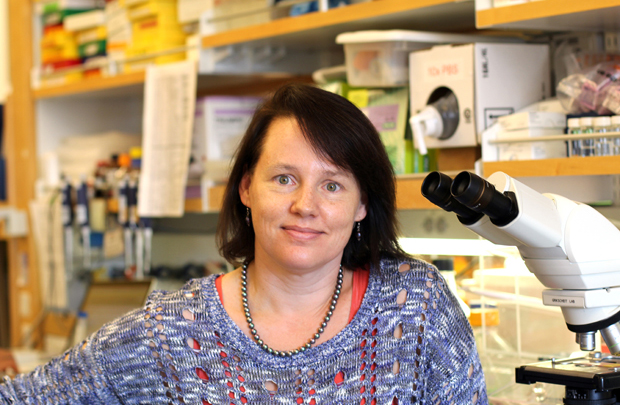Tracy Grikscheit, MD, really has her priorities straight.
“It goes: surgery, science, skiing. That’s the order,” said Grikscheit, principal investigator with USC Stem Cell and The Saban Research Institute of Children’s Hospital Los Angeles, attending surgeon at Children’s Hospital Los Angeles, and assistant professor of surgery at the Keck School of Medicine of USC and the USC Viterbi School of Engineering.
Even though Grikscheit believes that “surgery has to go before science, because the kids don’t follow a schedule when they are ill,” she has made astounding research breakthroughs. With $6.4 million in grants from the California Institute for Regenerative Medicine (CIRM), Grikscheit and her team grew human small and large intestine in the laboratory.
Their approach is relatively simple: take discarded human intestine from the operating room, break it up and put it on a felt-like, biodegradable tube in a special machine. Before long, the various progenitors and stem cells begin to work together to form new intestine, which hopefully can eventually be reconnected to the patient’s digestive tract.
Growing up near Alta, UT, Grikscheit discovered her passions for surgery, science and skiing. During high school, she visited the University of Utah lab that developed the artificial heart known as the Jarvik 7. This experience opened her eyes to the potential of combining medicine with engineering.
“I remember thinking, ‘That’s the future,’ ” she said.
By age 16, she was accepted to Harvard University, where she majored in biochemistry. She attended medical school and worked in a lab at Columbia University in New York, did her surgery residency and research in another lab at Massachusetts General Hospital in Boston, and completed her pediatric surgery residency at Seattle Children’s Hospital.
Before starting her job at Children’s Hospital Los Angeles in 2006, she decided to climb Lhakpa Ri, a Tibetan mountain with a view of Everest. The snows of the monsoon season came early, trapping her at 21,000 feet. The experience tempered her enthusiasm for summiting the world’s tallest peaks, and reminded her of the frontiers that matter most to her.
“There’s been this revolution in stem cell science in the last decade that’s getting very close to treating people,” she said. “What fun! Science is going to be curing babies.”
— Cristy Lytal


